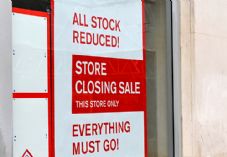UK DIY News
Up to 30% of UK retailers looking to change suppliers

The following is a press release issued by Barclays on 3rd August 2016.
- UK retailers reveal that Brexit may lead to changes in the location of their supply chain – UK, Asia and Africa expected to benefit
- Although half of those surveyed (52%) feel they are unprepared for Brexit, a majority (56%) think that Brexit will have no real impact, or a positive impact on their supply chain
- Exchange rates are identified as a primary concern, with four in five (81%) retailers expecting a negative impact, 70% are reviewing currency hedging following the vote
- Less than a third (31%) expect cost changes to result in price increases for consumers, as retailers look to absorb these costs
The origin of the products on British shelves could change as retailers adjust their supply chains following the UK’s vote to leave the EU, finds new research published by Barclays.
A survey of retailers carried out after the EU referendum, shows that many are already reviewing how their supply chains operate, as a result of the vote to leave the EU.
Retailers are looking to build more efficient supply chains (76%), and are considering changing suppliers (30%) and sourcing from different countries (28%).
In a potentially positive sign for the British economy, a third of retailers (32%) predict that they will source more from the United Kingdom, with only 12% expecting a reduction. Asia could also be a winner; 52% expect to increase supply chain activity in India and 43% in China. Consumers can expect to buy more products with an African supply source (38%), but Europe fares less well, with 43% of respondents anticipating a reduction in what they source from the region.
Commenting on the findings, Ian Gilmartin, Head of Retail & Wholesale at Barclays, said: “Getting your supply chain strategy right can be the key to success for retailers. It’s a mixed picture, but there are some encouraging findings in our post-Brexit survey. Retailers are not overly pessimistic about the impact of the vote on their supply chains, and yet they are still thinking carefully about what they need to do now, in particular with regards to which regions they source from and their foreign exchange strategy.
“It’s also reassuring to note that most retailers don’t intend to pass on costs to their customers and will instead look for other ways to tackle supply chain issues. The really significant news is that a third of retailers surveyed intend to increase domestic supply chain activity. At a time when we’ve all got to pull together to encourage growth in the UK this is a very positive sign, and at Barclays, we’re committed to doing all we can to support our clients with their supply chain strategy and to help businesses thrive.”
There are mixed feelings amongst retailers when considering the effect of the referendum vote on their supply chains. Although half (52%) think that their business is unprepared for Brexit, a small majority (56%) actually think that Brexit will have no real impact (41%) or a positive impact (15%) on their supply chain.
Cost management was already high on the agenda of finance directors before the EU vote. However, there are some reassuring findings on the cost implications of the referendum result, as most retailers (59%) expect supply chain costs to remain the same or just increase slightly. Consumers will also be relieved to discover that only a third of retailers (31%) expect cost changes to result in price increases for customers.
As might be expected following the recent moves in the currency markets, foreign exchange concerns are high on the list of supply chain considerations. Four in five retailers (81%) expect the effect of Brexit on foreign exchange rates to have a negative impact on their supply chain and 70% will be reviewing their currency hedging strategy in light of the referendum result.
A separate survey of retailers and consumers carried out before the Brexit vote found that close to two thirds of retailers (63%) believe that their supply chains are not cost-effective.
The continued rise of online shopping and the associated challenges of meeting consumer expectations for faster delivery times and multiple delivery options is a key supply chain issue (78%). In response, the average number of delivery options from large retailers is expected to increase from seven today to ten by 2019, with greatest customer demand being for faster delivery (59%), Sunday delivery (43%) and specific timeslots (37%).
Likewise the unpredictable nature of consumer demand is a significant consideration for retailers’ supply chains (72%). Consumers have their own concerns, 63% stating that retailers increasingly seem to stock products which are unsuitable to the weather.
Gilmartin added: “The boom in online retail puts huge pressure on supply chains. Unpredictable consumer demand, coupled with rising expectations around delivery options and speed of fulfilment mean that cost pressures are going to remain an issue. It’s important that retailers work with their suppliers to make sure consumers receive the level of service they want, and indeed now expect as standard, in the most cost-efficient way possible for the retailer.”
Source: Barclays Newsroom.
Link to original article here
Insight provides a host of information I need on many of our company’s largest customers. I use this information regularly with my team, both at a local level as well as with our other international operations. It’s extremely useful when sharing market intelligence information with our corporate office.











































